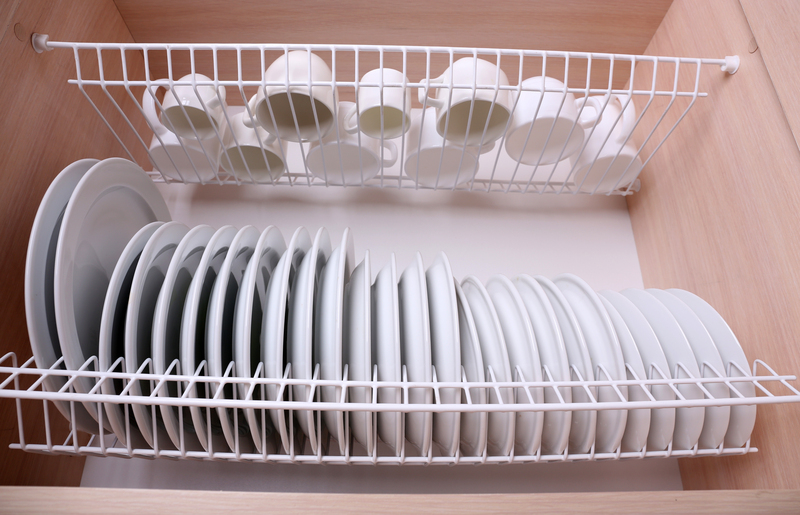Devising a Manageable House Cleaning Strategy and Keeping to It
Posted on 30/05/2025
Devising a Manageable House Cleaning Strategy and Keeping to It
Keeping a clean home shouldn't be a source of constant stress or a to-do list that never ends. With life pulling us in many directions--work, family, errands--it is easy to allow cleaning tasks to pile up, causing feelings of overwhelm. The secret to a dust-free, sparkling home is devising a manageable house cleaning strategy and following it consistently.

Why You Need a Thoughtful Home Cleaning Plan
A well-constructed cleaning strategy saves time, energy, and stress. Instead of dedicating entire weekends to rigorous cleaning, a proper home cleaning routine breaks chores into smaller, more manageable daily and weekly tasks. In this article, you'll discover step-by-step advice for creating your own house cleaning plan and tips for sticking to it.
Benefits of a Manageable House Cleaning Schedule
- Reduces Overwhelm: Small, regular tasks are less daunting than marathon cleaning sessions.
- Boosts Mental Health: Clean spaces foster tranquility, mental sharpness, and creativity.
- Protects Your Investment: Consistent cleaning prevents long-term damage to surfaces and furniture.
- Saves Time: Regular cleaning cuts overall cleaning time in half compared to infrequent, deep cleans.
- Promotes Good Health: A steady cleaning routine reduces dust, allergens, and germs, keeping your family healthier.
Key Steps in Devising Your Personalized House Cleaning Strategy
Each home (and household) is different, so your cleaning strategy should reflect your specific needs, habits, and schedules. Below, we've outlined a path to achieve and keep a consistently clean home, using smart house cleaning methods.
1. Assess Your Cleaning Needs and Prioritize
Start with a simple assessment: What areas of your home need cleaning most often? Where does clutter accumulate? Which tasks do you *dread* the most (and why)? Use these answers to create a priority list. For example, high-traffic zones like the kitchen and bathrooms may need daily attention, while guest rooms or storage areas require only occasional cleaning.
- List every room and key area in your home.
- Identify hot spots--places where mess gathers rapidly.
- Rank tasks by their frequency (daily, weekly, monthly, seasonally).
2. Break Down and Distribute Cleaning Tasks
The next step is to define your cleaning tasks and distribute them throughout your week or month. By compartmentalizing chores, you will avoid burnout and finish more efficiently. Create a house cleaning checklist with tasks broken down for each day.
- Daily Tasks: Dishes, wiping counters, tidying entryway, making beds, quick bathroom tidy.
- Weekly Tasks: Vacuuming, mopping, dusting, laundry, bathroom deep-clean, emptying trash.
- Monthly Tasks: Cleaning appliances, washing windows, decluttering closets, checking pantry for expired food.
- Seasonal Tasks: Deep carpet cleaning, cleaning behind furniture, organizing the garage or attic.
Action step: Write out your own cleaning schedule, assigning specific days for tasks that suit your energy and work/life commitments best.
3. Choose the Right Cleaning Tools and Products
A well-equipped cleaning arsenal makes housekeeping easier and more effective. Invest in reliable and versatile supplies such as microfiber cloths, a sturdy vacuum, quality mops, and eco-friendly cleaners. Store these items conveniently so you're always ready for quick cleanups.
- Keep products organized in baskets or caddies by room or by task.
- Restock supplies regularly so you're never caught unprepared.
Pro Tip: Choose multipurpose products--like an all-surface spray--to reduce clutter under your sink.
4. Assign Responsibilities for Shared Spaces
If you share your home with family members, roommates, or a partner, don't shoulder the entire cleaning workload yourself. Delegating promotes teamwork and maintains cleanliness even during busy stretches.
- Assign age-appropriate chores to children (picking up toys, wiping counters).
- Use a chore chart for clarity and accountability.
- Set regular family cleaning times for larger tasks or deep cleaning days.
Remember: Consistency is built together, and shared responsibility can even be fun.
5. Adjust the Strategy as Life Changes
A truly manageable home cleaning strategy should evolve as your life does. New job? Baby arriving? Kids in school? Adjust your plan as needed. The flexibility to adapt--whether due to changes in available time or energy--is key to maintaining an effective schedule.
Sticking to Your House Cleaning Routine: Practical Tips for Consistency
Making a plan is one thing; keeping to your cleaning strategy is another. Here are actionable solutions to help foster regularity until your routine becomes second nature:
1. Habit Stack Cleaning with Other Routines
Pair cleaning tasks with already-established habits. For instance, wipe kitchen counters after breakfast or vacuum while listening to your favorite podcast. By chaining chores to existing actions, cleaning becomes part of your daily rhythm.
- Combine dusting with TV time (it's more effective than you think!).
- Start laundry before cooking dinner to save time.
2. Set Timers and Keep Tasks Short
Avoid the "I'll-do-it-all-later" trap. Block out 10- to 20-minute windows for specific chores. Set a timer or use phone alarms to remind you. You'll be amazed at how much you accomplish--and the task feels less intimidating!
- Micro-cleaning (quick five minute wipe-downs or tidy-ups) makes a big difference.
- Focus on one or two rooms per session when time is tight.
3. Track Your Progress and Reward Yourself
Checking off completed tasks (whether on an app, calendar, or paper list) provides powerful motivation. Celebrate your success periodically--perhaps with your favorite coffee or a relaxing bath after a week of consistent cleaning.
- Visual charts or stickers work especially well for kids (and the young at heart!).
- Small rewards can keep spirits high and reinforce the new habit.
4. Don't Seek Perfection--Aim for Good Enough
A pristine home 24/7 is a fantasy for most people. Focus on progress over perfection. Tidiness and regular cleanliness are more sustainable--and far less stressful--than aiming for spotless floors at all times.
- Look for "good enough" benchmarks (e.g., clutter is picked up, bathroom is reasonably clean).
- Forgive yourself for unfinished tasks and pick up where you left off tomorrow.
5. Outsource When Needed
Sometimes, hiring a cleaning service for deep cleans or specialty tasks (carpet or window cleaning) provides immense relief--especially during life transitions, busy work seasons, or illness. If it's within your means, don't hesitate to outsource for peace of mind.
Sample Weekly House Cleaning Schedule
To help you get started, here's a sample weekly plan that demonstrates a balanced approach to cleaning:
- Monday: Kitchen deep clean (clear counters, mop floors, disinfect handles)
- Tuesday: Bathrooms (scrub toilets, sinks, mirrors, quick floor mop)
- Wednesday: Bedrooms (change sheets, dust, tidy closets)
- Thursday: Living areas and entryway (declutter, dust, vacuum/mop)
- Friday: Laundry day (wash, dry, fold, put away)
- Saturday: Special project or deep clean (windows, appliances, pantry)
- Sunday: Rest or family tidy-up for 15 minutes to reset for the week
Note: Feel free to customize this to fit your household's unique needs and routines!
Smart Cleaning Tips and Time-Saving Tricks
Incorporate these expert cleaning strategies to work smarter, not harder:
- Declutter First: Tidying before cleaning streamlines the process and keeps things organized longer.
- Top-to-Bottom, Left-to-Right: Always clean from higher to lower surfaces and from one end of the room to another to avoid missing spots or re-dirtying just-cleaned areas.
- Use the Right Tools: Microfiber cloths and squeegees clean faster and more thoroughly.
- Limit Supplies: Avoid product overload--a few multi-surface cleaners usually suffice.
- Minimize Paper Clutter: Designate an inbox for mail and paperwork for easier sorting later.
- Keep Entryways Clean: Use doormats and ask family to remove shoes to reduce incoming dirt.
- Set Up Donation/Purge Bags: Keep bags in closets or high-clutter areas for quick decluttering.
- Keep Cleaning Caddies Nearby: Store basics in high-traffic areas so quick touch-ups are a breeze.

Common Obstacles to Sticking With a House Cleaning Routine (and How to Overcome Them)
- Trouble finding time: Batch smaller chores throughout the week instead of doing them all at once.
- Lack of motivation: Pair tasks with enjoyable activities--music, podcasts, or even a phone call with a friend.
- Family not pitching in: Hold a quick meeting to discuss shared goals and benefits of a cleaner home for everyone.
- Perfection anxiety: Remind yourself that some dust or clutter is normal--aim for consistency over perfection.
- Forgetting tasks: Post your schedule on the fridge, use app reminders, or write tasks on a whiteboard in a communal area.
Conclusion: Stress Less, Live More with a Manageable House Cleaning Strategy
Having a doable house cleaning strategy transforms cleaning from a source of stress into a seamless, nearly automatic part of daily life. Remember, it's not about harsh rules or perfection--it's about making cleaning work for you and your household. With a balance of routine, teamwork, flexibility, and the right tools, you can enjoy a healthier, more welcoming, and peaceful home--without sacrificing all your free time. Begin today by creating a cleaning plan that fits your lifestyle, and watch how quickly a tidy home becomes your new normal.



